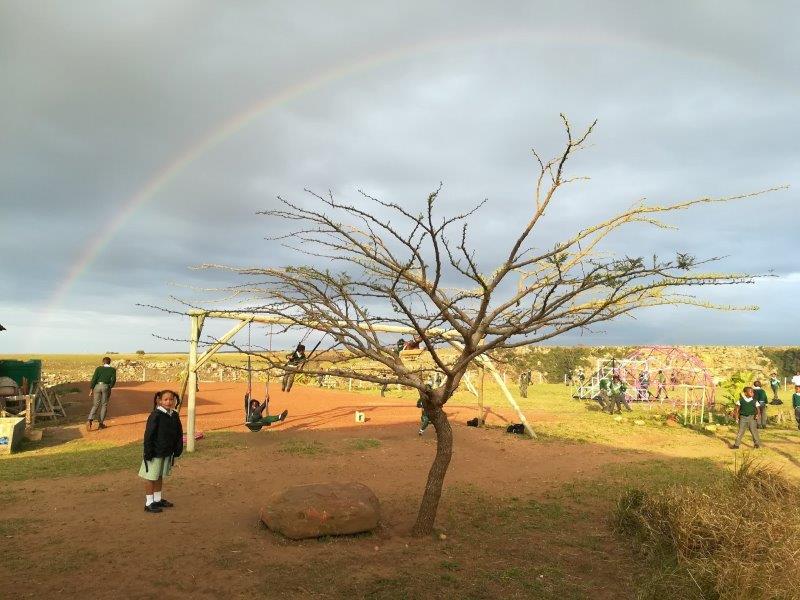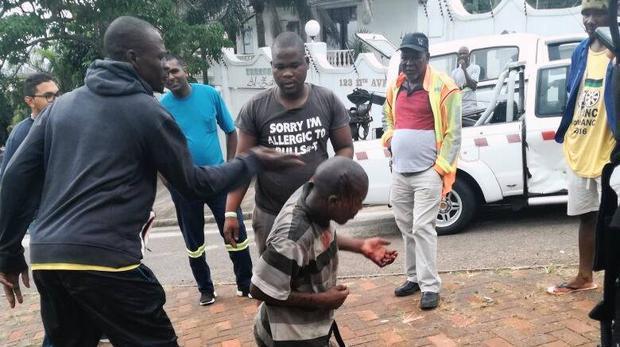In an impoverished community, a well-run school breaks the cycle of violence and poverty, reports Mlu Mdletshe
First published by Daily Maverick
It’s 12:05 at Ithuba Wild Coast Community College and there’s a blur of green and grey uniforms as the pupils tear it up at break-time.
Soccer balls and skipping ropes fly. Good natured cries and laughter fill the air on an unusually warm winter’s day.
From the shade of a lean-to used to store gardening and appliance tools, Phakamani Ngeleka, the school caretaker, takes it all in, pink tiffin-box in hand.
Most days at this time, Ngeleka takes a rest from replacing lights, connecting pipes and nursing the garden.
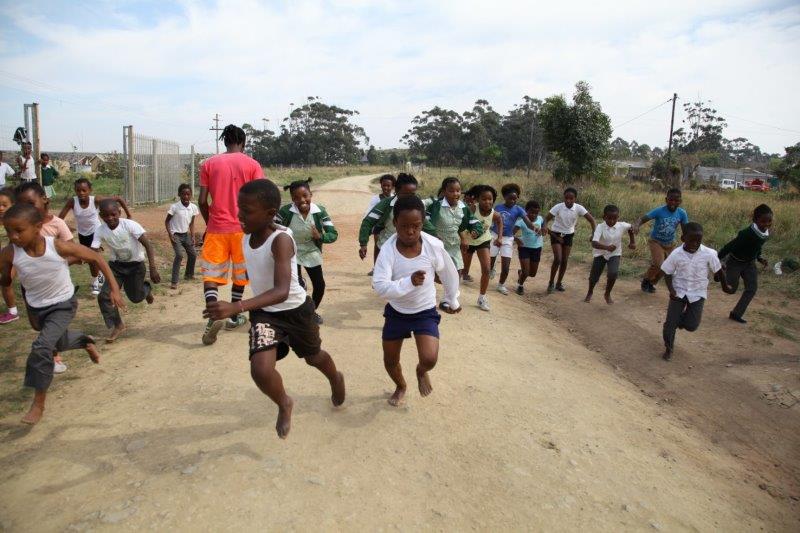
Sporty learners at Ithuba Wild Coast Community College dash past Phakamani Ngeleka (centre). Photo: Markus Dobmeier
“This is what I love to see,” he says. “Kids running around in safety. It makes me very happy.”
Break-time play is something the 32-year-old experienced all too briefly himself.
Chance
Ngeleka left school after Grade 5, but the man from Mabhanoyini village, in Mzamba, does not dwell on the past.
He saves his energy for helping others in his community on the northernmost stretch of the Eastern Cape’s Wild Coast.
Ithuba means “chance” and the private primary school has become Ngeleka’s second home in a place where opportunities are scarce.
“Ithuba is truly our chance to make the most of the little we have been given,” he says.
Ngeleka has been at the school from its very beginnings, nearly a decade ago.
S2arch
He was approached by representatives of the Austrian Association for Social and Sustainable Architecture, known as S2arch, who had already built a college outside Magagula, about 40 kilometres south-east of Johannesburg. The college is practically a village. It includes residential buildings, workshops where classroom furniture, uniforms and other products are made. Low-cost, “mini-shacks” house students and teachers who come from Europe to work as volunteers.
S2arch was established by Christoph Chorherr, a former leader of the Austrian Green Party. His interest in building another school, this time on the Wild Coast, was sparked by a hike through Pondoland.
Ngeleka says the 2010 soccer World Cup was just around the corner when S2arch reps, Markus Dobmeier, Elias Ruben and Marlene Wagner came to his home. They wanted help from local people to build the school, high above the Mzamba River, as well as a pedestrian bridge over the gorge.
Life-saver
Ngeleka’s friendly manner and building skills made him the perfect go-to-man. In turn the project proved a life-saver for Ngeleka.
The mother of his children had recently died from an aneurysm when he was offered a job as a brick-layer.
In January 2011, the school hosted its first Grade R class: 32 children in an unfinished classroom, all sharing a single portable toilet; meals were cooked at a neighbour’s kitchen and brought to the school at break time.
After that the project moved quickly.
Austrian and German architecture students got stuck in designing the college. And more than 300 travelled to South Africa as volunteers to work on the buildings with people from the area.
When the main building work was done, Ngeleka stayed on as a security guard, working nights.
His serious but friendly demeanour had caught the eye of the school’s managing director, Jackie du Toit.
“Besides being a very competent handyman, having gained experience with each phase of building, his passion and dedication to the success of the school impressed me,” she recalls.
She offered Ngeleka a permanent job as a caretaker.
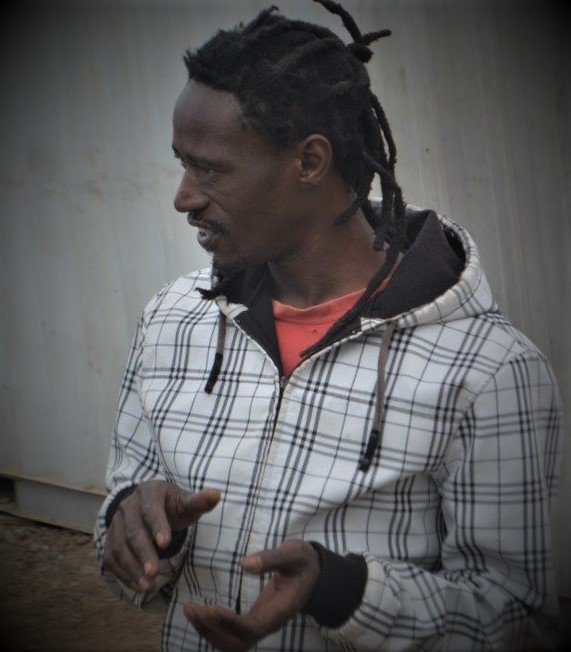
Care-taker, Phakamani Ngeleka. Photo: Mlu Mdletshe
“He has proven to be an invaluable employee applying creative thinking to recognise and solve problems. He takes this opportunity very seriously and also supervises teams of volunteer parents and assists in sports coaching, especially during the soccer season. We share a good understanding. I could not manage without him,” says Du Toit.
College family
Ngeleka’s own children, Angela and Allen, have become part of the college family, too.
Angela graduated last year and is now in Grade 8 at Nombuso High School. Allen is in Grade 5 at Ithuba, and is now a few months away from topping his father’s highest educational achievement.
You might say Ngeleka is a graduate of the school of hard knocks.
In 2002, at the age of 15, he lost his father to a stroke. It left him with little motivation and when he relocated to KwaNzimakwe, 10km from Trafalgar on the KZN South Coast, he drifted into crime and drug abuse.
Hard knocks
“I was eager to forget my situation at home and prove myself to the local gang. We broke into houses and took jewellery and appliances to sell, mostly to buy drugs and alcohol,” he recalls.
Then one night a neighbour saw the gang breaking into an unoccupied home. A shot was fired, killing one of Ngeleka’s friends. “We just ran away, leaving him to die,” he says.
Ngeleka spent the long walk back to KwaNzimakwe thinking about the path his life had taken – and the promise he had made to his father to listen to and respect his elder sister, Nomasonto.
Harsh rehabilitation followed.
“I locked him up inside the house for days,” says Nomasonto.
“My sister showed me love and support when I needed it most,” says Ngeleka.
“He was living a life that clearly wasn’t his. I was preaching to him that he should turn his life around or else we’d lose him too,” says Ngeleka.
Close call
In fact, more of Ngeleka’s friends would later die or end up in jail.
But that is all the past, says Nomasonto, who also works at Ithuba, as a Foundation Phase teacher assistant and Grade 1 isiXhosa teacher.
She is studying for a teaching degree through the University of South Africa.
Brother and sister embrace what Ithuba is all about: providing quality education to break the cycle of violence and poverty.
The college now caters for 306 children, from preschool to Grade 7.

The unique architectural design of Ithuba Wild Coast Community College created a pleasant learning environment. These photos were taken by German architect, Markus Dobmeier, who helped design the school and documented its development.
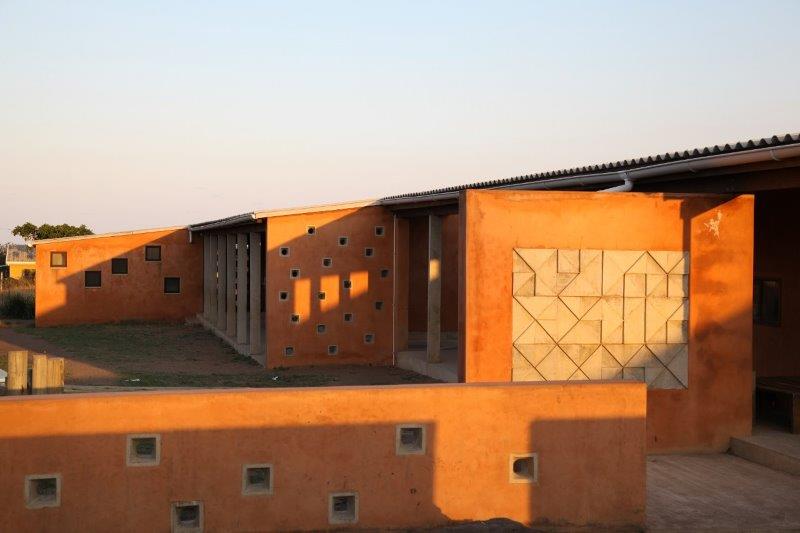
It has 10 classrooms, toilet blocks, a kitchen, staff room, a small library, administration offices and a hall.
The design-savvy, yet cost-effective architecture makes it something of a model compared with standard government schools.
Ngeleka hopes it will soon extend to high school level.
“Most pupils have to walk more than 7km to the nearest high school and its classes are overfilled, with 60 or more children,” says Ngeleka.
It’s 12:31, the bell rings. Break-time is over.
A Grade 7 prefect, Gysel Smith, walks by.
“That’s my niece, Nomasonto’s daughter,” Ngeleka beams.
In a few days time, Smith will lead her schoolmates on a 3km clean-up walk around the school and down to Mzamba River. Children also work in the school’s vegetable garden.
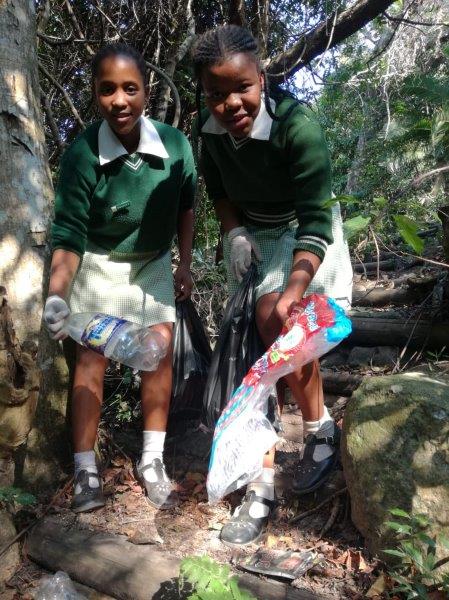
Grade 7 learners from Ithuba Wild Coast Community College, Gysel Smith (left) and Asonwabe Mpinda, help fight the battle against pollution in the broader Mzamba community.
As the last soccer ball flies and the children head back to class, Ngeleka reflects on his own journey.
He believes he has honoured a promise made to his children’s mother, to give them a better life than he had.
Ngeleka’s first name, Phakamani means “the family will rise”. It certainly looks that way.
Mdletshe is a Durban University of Technology journalism graduate enrolled on Roving Reporters training programme supported by the Human Elephant Foundation and Grindrod Bank
FEATURED IMAGE
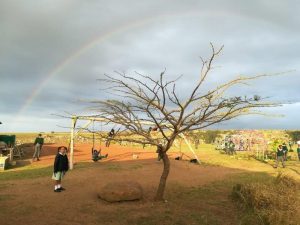
A rainbow rises over children at play at Ithuba Wild Coast Community College. Photo: Markus Dobmeier
